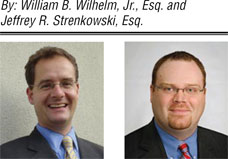|
April 2009 | Volume 12 / Number 4
Regulation Watch
The State Regulation Continues to Creep in on VoIP Providers
Recent legislation in several states has sought to regulate VoIP on a new range of issues. For example, New Mexico is currently considering legislation that could subject VoIP providers to rules on the discontinuation of services to customers, and would allow customers or other service providers to file complaints with the New Mexico Public Regulation Commission for service discontinuations that violate state standards. Washington State is likewise considering a bill that would prohibit state agencies from regulating VoIP rates, terms or conditions of service, but would potentially allow those agencies to impose fees for E911, telecommunications relay service, and the state universal service fund. It would also give the Washington State agencies the ability to require VoIP providers to pay any switched access charges or other intercarrier compensation that may eventually be determined to apply to VoIP services. Other states have recently sought to clarify issues related to taxation, service quality standards, access to E911 systems and infrastructure, and other matters. Until Congress, the FCC (News - Alert) or the courts provide a more specific jurisdictional demarcation, VoIP providers should prepare for the infusion of more state-based rules, fees and surcharges. IT William B. Wilhelm (News - Alert) is a partner and Jeffrey R. Strenkowski is an associate at the global law firm of Bingham McCutchen LLP. (www.bingham.com). The preceding represents the views of the authors only and does not necessarily represent the views of Bingham McCutchen LLP or its clients. Bingham McCutchen represented the Petitioners in several of the cases described above. Today @ TMC
Headlines
Upcoming Events
MSPWorld
The World's Premier Managed Services and Cloud Computing Event Click for Dates and Locations Corporate News
|
|





 After the release of the FCC’s Vonage (
After the release of the FCC’s Vonage (
